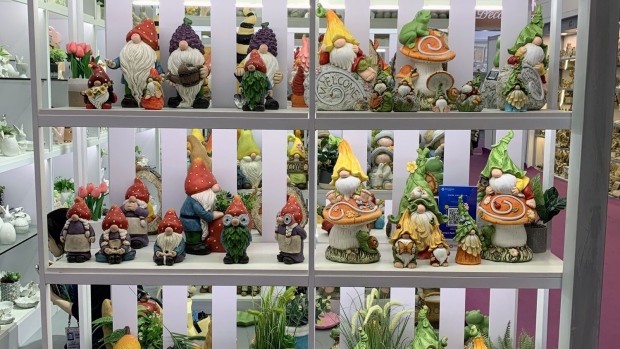May 7, 2023
China’s Main Trade Fair Struggles to Lure Buyers as Global Growth Slows
, Bloomberg News

(Bloomberg) -- China’s largest trade fair was meant to be a triumphant return for the world’s biggest manufacturing nation after three years of being mostly online. Instead, the mood was downbeat as factories grapple with a slowing global economy and a scarcity of US buyers.
The semi-annual event known as the Canton Fair kicked off on April 15, just as Chinese officials embarked on a charm offensive to lure foreign investors back after three years of Covid Zero policies that prevented in-person visits. However this year only $25.1 billion in transactions were agreed, according to a statement on Saturday after the end of the fair, which saw thousands of vendors displaying goods ranging from toys to electronics in a mammoth convention center in the southern city of Guangzhou.
That is well below 2008’s peak of $38 billion or the pre-pandemic level of $30 billion in 2019.
Despite an unexpected surge in March, China’s exports are expected to drop in 2023 after hitting a record last year as rising prices and interest rates, high inventory levels and the war in Ukraine act as brakes on consumer demand in the US and Europe. While there was crowds of exhibitors and overseas visitors at the fair this spring, buyers from Western nations were scarce, with many sellers commenting on their absence.
China Officials Warn of Challenges for Foreign Trade, Investment
Miland Houseware, a producer of anti-slip mats mainly for American and European customers like Walmart Inc. and Costco Wholesale Corp., had few of its target clients visit the company’s booth, said David, a sales manager who declined to give his last name.
“Demand is really weak in the U.S. now,” he said, something that was also apparent at a housewares fair he attended in Chicago earlier this year. “Our big clients aren’t placing new orders as they said they’re still digesting inventory.”
Booth Breaks
The staff of a manufacturer of high-end bathroom fixtures were eating lunch together in their booth on the day Bloomberg reporters visited.
“This wouldn’t have happened in past years,” said Abby Lin, a salesperson for a Dongguan-based factory that makes tissue boxes and soap dispensers. “It’s only because we don’t have visitors at all.”
While the largest number of foreign buyers were from Russia and the Middle East, most people at the fair were working for local trading firms who purchase for smaller international customers or for the domestic Chinese market, she said.
“No one is placing orders, they are just checking on the prices,” she said. “I do hope the global economy gets better soon - hopefully later this year. Nothing else can improve the situation.”
China’s factories have struggled to boost prices and fully extricate themselves from last year’s Covid-induced production slump, leading to producer price deflation and falling profits for industrial firms.
Pandemic Changes
Some bright spots during the pandemic have started to suffer as China reopens to the rest of the world and consumer priorities change.
Garden gnome demand was strong when Covid loomed, as people stayed home and gardened, said Rebecca Qiu, who works for Quanzhou Qingyi Co., a manufacturer of garden ornaments in Fujian.
However “people are overstocked now so we expect sales to weaken this year,” she said.
Even if demand picks up, some sellers are concerned that buyers will move on to products made in other regions. After China’s Covid restrictions last year crimped supply chains and complicated production and delivery schedules, many companies started to diversify their operations.
The number of “made in Vietnam” and “made in Mexico” labels on goods in Walmart and Dollar Tree Inc. stores is noticeably higher now than in 2019, when “Made in China” was everywhere, said Johnson Wang, founder of a Ningbo-based housewares manufacturing and trading company which mainly sells in the US.
Politics are exacerbating the situation. On a recent trip to the US some big customers told Wang they won’t place new orders with Chinese suppliers amid intensifying geopolitical tensions, information that led him to look look for new factories in Vietnam.
“I won’t expand my supplier partner network in China anymore,” he said. “There’s no point to do that if your clients are going away. Vietnam will be my new focus.”
It’s not just the US. Some of Lorne Aranoff’s Canadian customers said they would prefer to order from places other than China. Aranoff, a restaurant supplier, was headed to Vietnam after Guangzhou to investigate manufacturers.
However, it won’t be easy to replace or replicate all the elements available in China, where extensive supply chains and reliable relationships have been built over the course of years.
“People are fooling themselves if they think they can find what they can find here elsewhere,” said Rob Siwiec, a buyer for Dollarama Inc. in Canada, who was back at the fair to reconnect with suppliers after three years away. He also planned to travel to other parts of the country for factory visits.
“The competitive advantage that China has is still very strong,” he said.
©2023 Bloomberg L.P.


